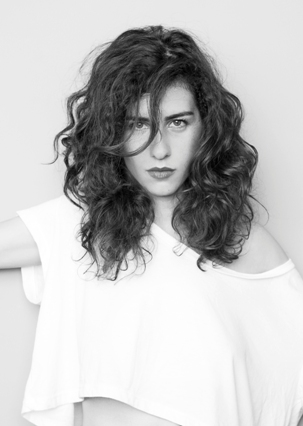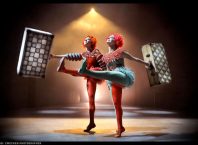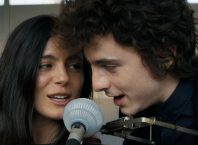Tamar Eisenman is the kind of musician that makes me feel I need to invent a new vocabulary for writing. The words I know just don’t seem to cover the range and depth of all she is and does. An amazing guitarist who has been playing since the age of six, Eisenman writes songs that move in every way. Alone with her guitar or performing with her band, her stage presence is charged with energy that sends you flying, or diving deep into feelings. I’ve been wanting to talk to her for a few years, and now, just as she is on the brink of releasing a new album in Hebrew – very aptly called Limbo – after three albums and an EP (all but one self-produced) all in English, it feels like the right moment.

Sitting down to talk with Tamar Eisenman, the day after InDNegev and before her upcoming concert at the Piano Festival on November 7th, I finally had the chance to hear about it all from her perspective.
Ayelet Dekel: You are a guitarist, singer, songwriter, you produce your own albums – you radiate a lot of power. You have your quiet and lyric songs too, but you’re a real rocker, and that’s rare on the Israeli scene. You have a strong presence, and when you sang in Hebrew, it amazed me. Maybe it was my emotional response… it just felt so much stronger.
Tamar Eisenman: We can look at it from several different directions. Where the song found you, because your own story is relevant here. There is the cultural, Israeli story, and my personal story which has many layers. Most crucial is the general, cultural issue. I don’t know your story but Israeli culture, like the rest of the world, is always going through changes. Still there is a feeling in the last decade that on one hand something very good is happening artistically – becoming more open, connecting to the world, and on the other hand where does entertainment fit into this…everything is dividing into so many sub-genres, it’s hard for culture and art to gather people in under one umbrella. So many umbrellas and not enough rain.
AD: In terms of our personal stories, we have shared geography, living in the same place at about the same time.
TE: I lived in San Francisco from 1986 – 1989. I was in first grade. Not everyone has had that experience, [living in a different language and culture] but it’s still… maybe not physically…
AD: I feel that perhaps as a culture we are living this experience?
TE: Yes. Influenced by the internet for sure, and the whole world is experiencing this, each culture from its own perspective. I think that Israel, the State of Israel, Eretz Israel, is so young, very young and also in the process of becoming. We’re still in first grade here.
“We’re still in first grade here…”
Some of it is amazing and beautiful, but it’s like someone still in search of identity, who is mostly relying on, drawing on the Holocaust, drawing its ideology from the past. We rely very much on our history – and that’s excellent. It makes us a society with depth and breadth, but we also need to set some limits and move forward. That’s how I feel.
On one hand there is something very beautiful in the feeling that …let’s call it for the moment the audience, but it is all of us – people know how to connect around something that we …let’s call it shira betzibur [literally community sing-along, a very central Israeli-culture phenomenon]. We connect – musically – around something nostalgic. Something that arouses memory, compassion, belonging, unity. On the other hand, for me as an artist I feel that it’s dangerous to stay there too long.
Connecting to the question of English, at the beginning of my musical path, I wrote in English and released an EP in English (Tamar Eisenman 2003). I received good reviews, a huge embrace, and I hadn’t had any expectations, I just did exactly what my guts told me to do without thinking about it.
Then I began hearing all the talk: why sing in English, all the criticism, and talking about the glass ceiling, this can’t go anywhere, you can’t make a living [in Israel if you are a musician performing songs in English], it’s very nice but will only appeal to audiences abroad. I must say that with the perspective I have now, there is substance to all this talk, but I’m so glad I didn’t feel it then. Because after all, the opposite has also been proven true with all that’s happened in the past ten years. Not just my own music. I think that today there may be more musicians in Israel who sing in English than in Hebrew. People are more open to these ideas…What does that even mean ‘people have opened up to it’? We should always be open…
I don’t mean that every artist should sing in English or French or German…I’m saying that each person should find her language. It’s an instrument, an instrument for expression. OK?
I might decide that this coffee cup is an instrument for expression. It’s not certain that I will end up doing anything with it, but maybe in that moment, it will inspire me in some way. And I won’t prevent myself from experiencing that process with this instrument.
At the time, I felt that what was happening was authentic, emotional, important, and should be brought out [referring to her early work]. Some people loved it and were open, some raised an eyebrow. I’m not just talking about myself, I’m talking about the last ten years: Hadara Levin, Geva Alon, and Asaf Avidan. Look at them now, they are where they are now because they did it here, and persisted, because they insisted on doing something that was hard to accept at the time. Thanks to them, today more artists are singing in English and our culture is open to it. We have things like InDNegev, year after year – it doesn’t matter who sings in Hebrew or English. We are open to it. It’s all part of our journey to let go of all the things we need to be free of here. And it’s hard to do that in our reality, in these circumstances, I understand that.
“Language is an instrument”
TE: Language is an instrument. When I say the culture here – and I’m part of all this too – is dependent on memory, also in a beautiful and moving way, relying on something nostalgic – that connection is often through language. But if I neutralize this and use language as a musical instrument…
I’m not talking about using gibberish, or words without grammar, playing with phrasing in an extreme way. But from my perspective in the creative process, when I look at the full spectrum of music – the guitar, drums melody, language, words, bass, drums – in the creative process, I try to use them all in the same hierarchy. In later stages there are many decisions taken, it’s not 100 percent. Sometimes one thing wins out over the other: sometimes the guitar conquers the song, or the text wins out over the rhythm. Many decisions are made, influenced by artistic or commercial reasons. But it’s not sacred.
AD: If I am interpreting correctly, you’re saying that just as you weren’t born playing guitar, you learned to play guitar, that is your approach to language. You can choose an instrument whether it is English or Hebrew and use it to make your music.
TE: Yes. It brings out something different from me and for the listener, and of course the choice makes an impact. It’s like when I play an acoustic arrangement of a song or a punk arrangement – it will have a different effect. It [the choice of language] has influences and consequences. I always try, as a concept… I wish I could learn French quickly to sing in French, and I wish I could learn to play the trumpet. I can bring in someone to play the trumpet on a song… but I want to sing… so it’s a whole system of decisions.
“I discovered the singer within me”
AD: Just as there are differences between the albums. Each is very different, but up until now they had English in common.
TE: I think that perhaps outwardly English is the common element, but there is also the dominance of the guitar, the arrangements around the rhythm section, something groovy… but you can also see changes in the albums.
When I listen to the albums in the beginning, I hear someone who is not yet a singer, especially on the EP, almost whispering. On latest album [Limbo] that isn’t out yet, I feel that I discovered the singer within me. The guitarist was always dominant and there was always a dialogue between the singer and the guitar. There is always a guitar who is also singer – not just accompanying the singer. Everyone is accompanying the guitar and the singer. And on this album, I chose that the singer be dominant – if I am shifting from English to Hebrew, then I’ll go all the way. I suppose something about this instrument [Hebrew] demanded that change. It’s not absolute, there are guitar solos… the guitar is still there…I am talking about nuances.
If I take a rock ensemble and bring someone to play violin, I’ll need to make room in the arrangement for the violin to be heard, because it’s from a different family of instruments. I need to amplify it differently, I need to create room for it in the mix. And it very well may be that this language, like the violin, the Hebrew language needs this special attention.
In writing and singing in Hebrew, I really wanted to avoid making it something sacred. I kept looking for ways that the guitar can break into this dance, because for me the guitar is a symbol of cross-genre, cross-languages, my origins, my foundation, this San Francisco, memory… Music is feeling and if I managed to do this better or not with Hebrew… I don’t know what it did for you… but I also connected to something new in this project, connected to a new world. After all, without making it sacred, it’s the language with which I buy eggs at the store – how does that influence my art? It’s the language I speak every day, my mother tongue, it’s many things. It doesn’t always have to be the language in which I create art.
AD: Did you make a conscious decision to write in Hebrew?
TE: I wrote some few songs in Hebrew all along. It’s something that was slowly cooking for a long time. I didn’t decide: from now on I’m writing in Hebrew. I was already writing in Hebrew. I also worked on many projects with many other artists in parallel to my own music, so I was exposed to a lot of Hebrew, at home too. Over the years I sang classic songs in Hebrew – Danny Sanderson, Miki Gavrielov… and I enjoyed it. In parallel to Limbo, I was also working on an album in English that I am also about to finish, so it wasn’t like saying from now on I’m a vegetarian. It’s a natural process.
I felt that writing, working in Hebrew provides a kind of closure to my albums so far in English and marks the beginning of a new chapter.
TE: There is a song on the new album called Limbo and that will be the name of the album. I wrote this song in English. I loved the melody and arrangement and the text was very good in English but something… something hadn’t fully ripened.. I wasn’t ready to call it a wrap. I consulted with Danny Sanderson who came to listen to my new materials and I said I was thinking of changing the text perhaps even doing something in Hebrew… and I wrote to Yankale Rotblit and he wrote the text for this song. I gave him the melody and arrangement as I had produced it, and we talked about the song and what I had written in English but I told him he gets a blank page, and can start from the beginning. He took it, whether consciously or unconsciously, he took something from the English version, but he told it in his own way… No one else can compare to him as a writer, in my eyes. He always hits the target…from his experience and his encounter with me, he told the story of the album, because this limbo is exactly… and he wrote this without having heard the rest of the songs on the album. It’s amazing … sometimes very mystical things happen in the creative process. Working in parallel on the albums in Hebrew and English, the transition from guitar to singer, Hebrew to English, growing older, moving from my 20s to my 30s – this limbo.
AD: I’d love to hear the song, these are issues I deal with all the time… this limbo… defines my life.
TE: Mine too. We all are, all the time, at every moment – we are always in this limbo.
Tamar Eisenman will be performing songs from her new album Limbo at the Piano Festival, along with songs from her albums Gymnasium and Time For Creation in special arrangements that focus, as she said, on the “tensions, or two worlds of the guitar vs. the piano across genres and very Limbo-ish.” Performing with Tamar will be: Karen Teperberg – drums, Mickey Warshi – Bass, Ido Zeleznik – Piano and Keyboards. The performance will take place at 20:30 in the Kaufman Hall at the Tel Aviv Museum of Art. Tickets may be ordered online via this link; and the full Piano Festival program may be viewed on the festival website.
Links: Tamar Eisenman website, facebook page






A genuine, heartfelt interview and exchange on Tamar’s use of ‘language as an instrument’. I’ll be in a Limbo until Tamar’s new album is released, and we can listen to her new songs. English or Hebrew, she is spellbinding with a musical soul like no other.
Comments are closed.